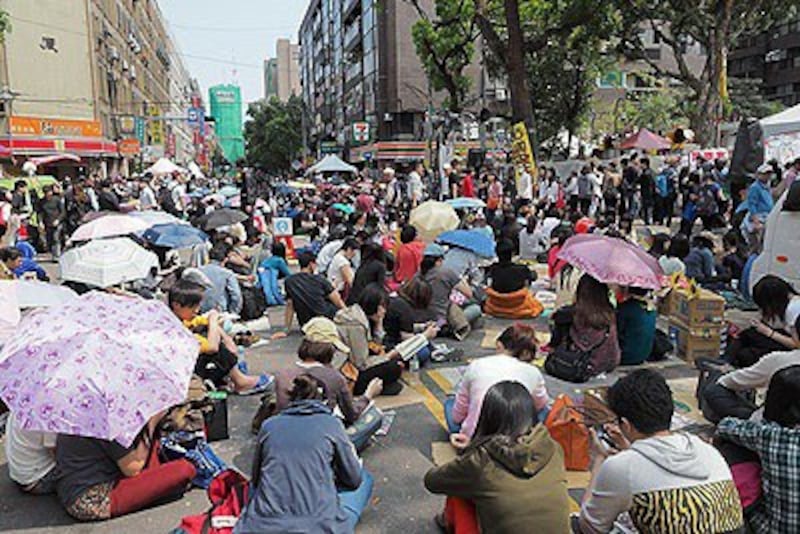Taiwan President Ma Ying-jeou, facing the biggest challenge to his rule since he took office in 2008, offered Tuesday to meet with students who have occupied the island's parliament buildings for the past week in protest against a controversial trade deal with China.
Hundreds of students began their "Occupy" campaign last Tuesday in a bid to prevent lawmakers from ratifying the trade agreement, signed in July and aimed at opening up further trade in services between China and Taiwan, which split 65 years ago after a civil war.
The students clashed with police who fired water cannon into a group of protesters on Monday after they stormed the nearby government headquarters.
One protester, Wei Yang, who had been arrested on suspicion of "mass obstruction of public duty," and other public order offenses, was released unconditionally on Monday after the Taipei district court said there was insufficient evidence to mount a case.
"As the continued paralyzing of parliament has impacted the operation of parliament and government, President Ma Ying-jeou is willing to invite student leaders to the presidential office to discuss the service trade agreement ... so as to help parliament resume operation," Ma's spokeswoman Li Jia-fei said in a statement on Tuesday.
Protesters willing to meet
The protesters said they were willing to meet with Ma, but are continuing to demand the government pass new laws requiring extensive consultation before any agreements with China are finalized.
Student leader Chen Wei-ting said the students wanted to meet Ma "on a public platform" outside the gates of Taipei's imposing presidential palace.
"Then everyone will know exactly is said during our talks," he said.
However, the protesters stopped short of pressing a previous demand that Ma agree to certain preconditions before talks took place.

Another student representative, Lin Feifan, said students still believed that further public debate should take place, however.
"That debate should be about whether the process for cross-straits agreements should be enshrined in law, and also about whether [that process] should be completed before the service trade pact is ratified," Lin said.
Chen agreed.
"We ask parliament to send the service trade pact back to the cabinet until such time as new legislation to monitor cross-strait agreements has been passed," Chen told reporters.
"Then parliament can review the pact," he said.
Critics of the trade agreement, signed between China, which regards Taiwan as a renegade province, and Taiwan, which has been governed separately since the end of a civil war in 1949, say it will damage the local economy and leave the democratic island vulnerable to political manipulation by Beijing.
Angry student protesters stormed into the Legislative Yuan, the island's parliament, last Tuesday, demanding that the government review the agreement clause by clause.
A date has yet to be set for the meeting between student leaders and President Ma, who says that Taiwan's economy is reliant on such agreements to flourish, and to counter the political isolation imposed by Beijing, which has threatened to use force should the island ever declare independence.
Major parties paralyzed
The stand-off has paralyzed the island's three major parliamentary parties.
Lin Hung-chih, chief whip for the ruling Kuomintang (KMT) Nationalist Party, has said his party is open to a line-by-line review of the cross-strait service trade agreement, as requested by students, but opposes its being returned to the executive.
However, meetings between the KMT, the Democratic Progressive Party (DPP) and the Taiwan Solidarity Union (TSU) to discuss the ongoing gridlock have broken down repeatedly.
"At today's meetings ... the TSU suggested that the service trade pact be returned [to the cabinet]," Lin told reporters on Tuesday. "The DPP said it should be substantively re-examined, and then subjected to renewed talks."
"Because of this situation, there was no progress at today's talks," Lin said.
Ma has promoted a thaw in previously icy relations with Beijing since his election in 2008, beginning with the signing of a wide-ranging Economic Cooperation Framework Agreement in 2010.
However, Beijing continues to oppose bitterly all attempts by Taipei to win representation on international bodies in its own right, saying the island is a part of China awaiting reunification.
Reported by Chung Kuang-cheng for RFA's Cantonese Service and by Lee Tung for the Mandarin Service. Translated and written in English by Luisetta Mudie.
